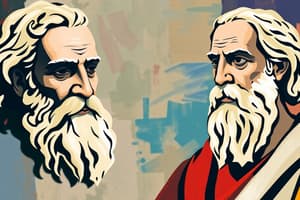Podcast
Questions and Answers
What does Socrates believe is the only evil?
What does Socrates believe is the only evil?
- Nature
- Knowledge
- Ignorance (correct)
- Self-reflection
What is the process of looking at oneself called according to Socrates?
What is the process of looking at oneself called according to Socrates?
- Self-reflection
- Nature
- Introspection (correct)
- Reminiscence
What does Socrates believe a man must live according to?
What does Socrates believe a man must live according to?
- His desires
- His beliefs
- His nature (correct)
- His actions
According to Plato, what are the three distinct elements of a person's inner life?
According to Plato, what are the three distinct elements of a person's inner life?
What does the appetite soul mainly consider?
What does the appetite soul mainly consider?
What is the hot-blooded part or spirited soul concerned with?
What is the hot-blooded part or spirited soul concerned with?
Who wrote and compiled Socrates' teachings after his death?
Who wrote and compiled Socrates' teachings after his death?
According to Plato, what is the measure of a man?
According to Plato, what is the measure of a man?
Flashcards are hidden until you start studying
Study Notes
Socrates' Beliefs
- Socrates holds that ignorance is the only true evil, suggesting that all wrongdoing stems from a lack of knowledge.
- Self-examination is the process of looking at oneself, termed "the examined life," which Socrates considered essential for personal growth and morality.
- He emphasizes that a man must live according to virtuous principles and one's own understanding of the good.
Plato's Perspective on Inner Life
- Plato outlines three distinct elements of a person's inner life: the rational soul, the spirited soul, and the appetitive soul.
- The appetitive soul primarily addresses desires, focusing on physical pleasures and material needs.
- The spirited soul is associated with emotions like anger and pride, driving ambitions and actions related to honor and courage.
Socratic Teachings and Legacy
- Plato, a student of Socrates, wrote and compiled his teachings after Socrates' death, preserving and interpreting his philosophical ideas.
- According to Plato, the measure of a man lies in his ability to know himself and pursue wisdom, reflecting Socratic principles of self-awareness and moral integrity.
Studying That Suits You
Use AI to generate personalized quizzes and flashcards to suit your learning preferences.




